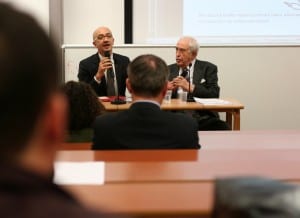Honouring the Righteous
By Robert Eagle, on 3 May 2012
 I have always thought that the Italian military from the 1920s until 1943 were simply fascists and puppets of the Nazis. At UCL on 24 April, Holocaust survivor Imre Rochlitz and his son Joseph presented the easily forgotten account of many Italian soldiers’ determination to thwart the transfer of up to 30,000 Jews into German hands during WWII.
I have always thought that the Italian military from the 1920s until 1943 were simply fascists and puppets of the Nazis. At UCL on 24 April, Holocaust survivor Imre Rochlitz and his son Joseph presented the easily forgotten account of many Italian soldiers’ determination to thwart the transfer of up to 30,000 Jews into German hands during WWII.
Titled Honouring the Righteous, in recognition of both Holocaust survivors and those who saved their lives, the event was organised by the UCL European Institute, the UCL School of Slavonic and East European Studies (SSEES) and the UCL Department of Hebrew and Jewish Studies.
Joseph Rochlitz screened his 1994 documentary, The Righteous Enemy, which illuminated how Italian soldiers repeatedly disobeyed demands from Nazi officials to hand over Jews from Italian-occupied Croatia, Greece and southern France. Interviews with Italian commanders revealed their determination to undermine even direct orders from Mussolini to comply with Nazi directives.
Imre Rochlitz read excerpts from his recently published memoirs, Accident of Fate. In 1938, at the age of 13, he fled Austria for Yugoslavia, following the Nazi Anschluss, leaving behind his family.
In 1942 the Ustaše (Croatian fascists) deported him to the Jasenovac death camp. On the verge of death, Rochlitz was released due to the extraordinary intervention of a Nazi general.
He escaped to the Adriatic coast, where he and several thousand other Jewish refugees were under the protection of the Italian army. After Italy’s surrender, he joined Tito’s Partisans, ascended the ranks to officer and rescued dozens of downed Allied airmen. He eventually settled in London.
Imre Rochlitz’s tale of survival may sound, at first, like many other extraordinary memoirs of Holocaust survivors who escaped death through a mixture of determination and fate. But Professor Michael Berkowitz, (UCL Hebrew & Jewish Studies), believes Rochlitz’s account is a significant resource for historians, in addition to being an engaging book for the layperson.
Rochlitz presents a rare, first-hand perspective of the plight of Jews in Yugoslavia during the Holocaust – of whom 68,000 were killed by the Ustaše and the Nazis – and then as a Jew serving in the Yugoslav Partisan resistance.
According to event convener Dr Bojan Aleksov (UCL SSEES), what makes the book unique is the way in which he writes about subjects often taboo in war veterans’ memoirs. Rochlitz does not shy away from detailing personal moments from the grim daily life of Ustaše death camps to the sexual activities of Yugoslav Partisans.
Imre Rochlitz believes that his survival was ultimately down to his ‘good fortune’– which includes the courageous defiance of the Italian army.
Image: Dr Bojan Aleksov of SSEES (left) and Imre Rochlitz at the event.
 Close
Close

